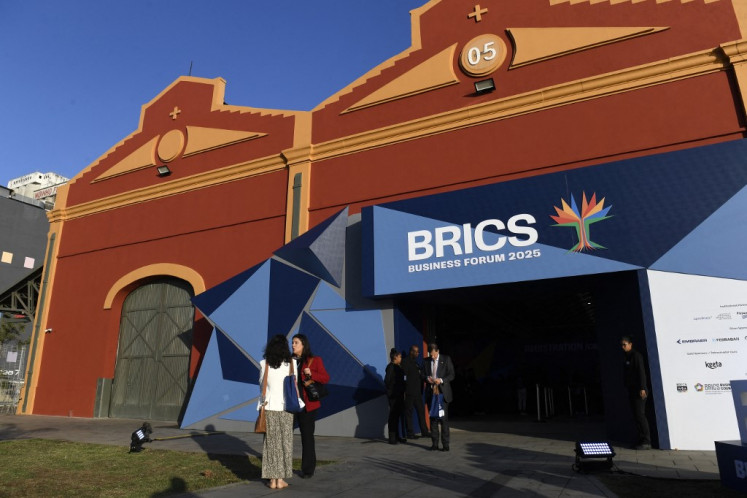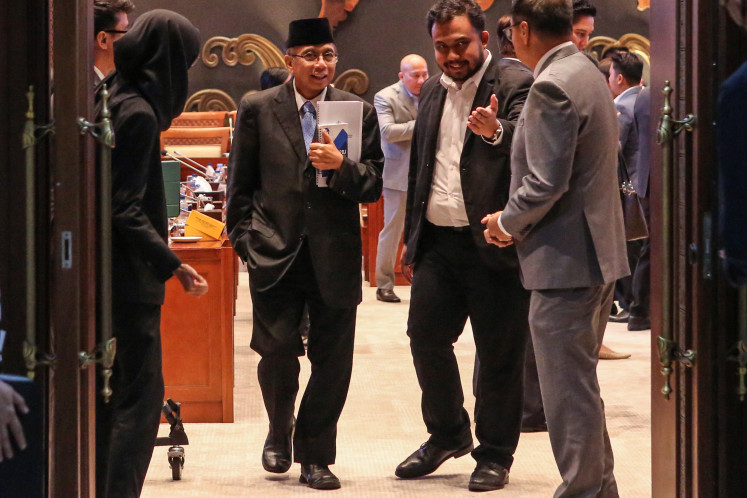Popular Reads
Top Results
Can't find what you're looking for?
View all search resultsPopular Reads
Top Results
Can't find what you're looking for?
View all search resultsIPC seeks to digitizalize all ports next year
Log in logistics: A worker logs in containers at the container terminal of Tanjung Priok Port in North Jakarta on Nov
Change text size
Gift Premium Articles
to Anyone
L
og in logistics: A worker logs in containers at the container terminal of Tanjung Priok Port in North Jakarta on Nov. 14. The dwell time at the port has fallen to under three days, from six to seven days in the past.(JP/Dhoni Setiawan)
State-owned Indonesia Port Corporation (IPC) aims to go digital at all ports it operates next year, after significantly cutting dwell times at Indonesia’s largest and most crowded port, Tanjung Priok in North Jakarta, through digitalization.
At Tanjung Priok, the dwell time — the amount of time goods stay in a port and an indicator of logistics efficiency — has fallen to under three days, from six to seven days in the past, said IPC president director Elvyn G. Masassya.
IPC, which manages 12 seaports across Indonesia, is preparing to implement full digitalization at all ports by 2020, he added. Today, most digitalization efforts are implemented at Tanjung Priok.
“Many services at the [Tanjung Priok] port are now digitalized,” said Elvyn, citing as examples the terminal operating system to manage loading and unloading activities, as well as the auto tally technology to count containers, which were previously tallied manually.
The digitalization effort, Elvyn added, had made goods movement in the port faster and more accurate.
Port dwell times used to be one of the bottlenecks in Indonesia’s business environment, with lengthy and unpredictable time spent by freight at seaports. Today, however, Indonesia’s rank in the World Bank’s Logistics Performance Index (LPI) has improved to 46th in 2018, from 53rd in 2014.
The shorter dwell time in Tanjung Priok, which handles more than half of Indonesia’s intra-shipment cargo deliveries, has been lauded by logistics business players.
“The time that [goods] stay [at port] before they get loaded on the vessel was about seven days in the past, but today it has been cut to 3.2 to 3.7 days,” said international freight service provider DHL Forwarding Indonesia president director Vincent KC Yong on the sidelines of a recent company event.
“So, it’s a lot better. We can see that as a result, port congestion is reducing and productivity is also increasing as wait times are drastically reduced,” Vincent added.
Digitalization at seaports not only helps cut dwell times but generally eases day-to-day operations and increases productivity while saving time and reducing costs, Elvyn said.
Apart from the terminal operating system, IPC also implements a marine operating system that keeps the port
operator informed about vessel times of arrival and departure, countries of origin and destination, as well as the type of goods aboard the vessels, thus speeding up the verification process at the port.
There is also an auto gate system that allows for an automatic recording of what is inside a truck and weighing the goods inside the truck container.
“We’ve also implemented a vessel traffic system. In the past, when a ship was coming we used the conventional way of communicating by telephone, but the vessel traffic system provides information on the time of arrival,” said Elvyn.
IPC recorded Rp 2.21 trillion (US$1.57 billion) in profits up to September this year, an increase of 18.39 percent on the same period last year. The company also saw an increase in revenue to Rp 8.57 trillion in the nine-month period, growing by 2.41 percent from same period last year.










